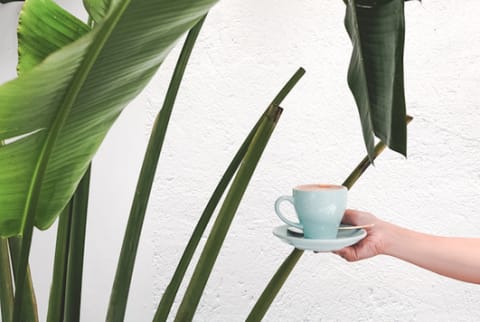Advertisement
Is Coffee Actually Bad For You? A Doctor Explains


Let's face it: Americans love their coffee. In fact, coffee is the number one1 way most people get antioxidants.
But is coffee really healthy? One day we see studies that support coffee and the next day we see 10 reasons why coffee is bad. So let's uncover the truth about this aromatic beverage most of us love.
On the one hand, studies2 show coffee decreases your risk for type 2 diabetes, lowers cancer risk, and improves mood and memory. Coffee can also boost metabolism3 as well as sports performance3.
Yet coffee can become highly addictive, altering stress hormones while making you feel simultaneously wired and tired.
You should probably take a break from coffee if...
Before jumping to conclusions, remember those blurred lines aren't entirely about coffee itself. It also depends on the person drinking coffee. The way you respond to coffee is often determined by genetics affecting caffeine metabolism. For one person, a cup could have them bouncing off the walls, while another person can have a triple espresso at dinner and fall fast asleep easily.
In other words, everyone is different and experience coffee's effects differently. One patient complained about fatigue, restlessness, and heart palpitations. Obviously, I recommended avoiding coffee.
Likewise, if you suffer from adrenal fatigue, coffee could easily become dangerous. Some individuals might also be sensitive to coffee beans, meaning their bodies can't tolerate them and they create unpleasant symptoms.
I had one patient who drank 12 cups of coffee a day yet constantly fell asleep at his desk. This person could barely function and couldn’t understand why he felt so exhausted.
When we tapered him off coffee, he began to sleep at night rather than fall asleep at his desk because he wasn't getting proper rest his body desperately needed.
If you decide to do a coffee detox, be sure to do it right.
If any of these things sound familiar, coffee probably isn't for you. If you wonder whether coffee is OK for you, treat it like any other potential toxic trigger and eliminate it for at least three weeks, especially if you're addicted and can't seem to function without coffee or if you drink multiple cups a day.
The best way to wean off coffee is switching from drinking multiple cups to just one cup and eventually half a cup. You might also switch to green tea or herbal teas and warm lemon water with a bit of raw honey.
As with any detox plan, drink adequate amounts of water and get plenty of rest during this time. I also suggest regular exercise to stabilize energy levels. Should you get irritable or have difficulty sleeping, supplement with 200 to 500 mg of magnesium citrate before bed. My favorite detoxification rituals include a sauna, meditation, and yoga. I provide powerful techniques to relax and combat stress on my website.
When you reintroduce coffee, be attentive how you feel. Pay attention to your energy levels, symptoms like anxiety or jittery feelings, or changes in digestion. It's perfect find if you realize coffee just does not work for you. Other health-friendly beverages include green tea or non-coffee lattes using reishi powder and other powerful herbs.
If coffee isn't bothering you...great! Here are some suggestions on how to optimize it for health.
If you find you can occasionally tolerate coffee, drink it black rather than adding milk and sugar. These two culprits do more damage than the actual coffee.
Alternately, add fat to your coffee. Once people taste the creamy, frothy goodness of fat blended with coffee, they don't miss milk at all. You've probably heard of Bulletproof Coffee, which blends MCT oil and a bit of grass-fed butter or ghee with high-quality, organic coffee. This delicious beverage keeps me satiated for hours, cuts cravings, and keeps my brain extremely sharp. You can also drink this before exercise for steady energy levels without coffee's crash.
In my book, Eat Fat, Get Thin I have a great way to prepare coffee, which you can also find here. Like everything else, there is no one-size-fits-all approach about coffee. For some people it works; others, not so much. You must determine whether coffee works for you.
